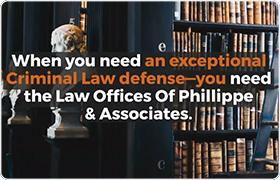Los Indios Felony Lawyer, Texas, page 3
Sponsored Law Firm
-
 x
x

Click For More Info:
-
The Law Office Christopher Phillippe
104 North Express Way Brownsville, TX 78521» view mapCriminal Defense Law Helping Those Facing Difficult Times
We are confident in our ability to resolve difficult legal issues, and we will use our years of experience to represent your best interests.
800-659-6781
Not enough matches for Los Indios Felony lawyer.
Below are all Los Indios Criminal lawyers.
Richard Robert Rodriguez
Real Estate, Criminal, Business & Trade, Litigation
Status: In Good Standing Licensed: 33 Years
 Christopher Phillippe Brownsville, TX
Christopher Phillippe Brownsville, TX Practice AreasExpertise
Practice AreasExpertise
